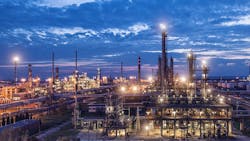MOL Group adds biodiesel production at Danube refinery
Hungary’s MOL Group has started production of renewable diesel at its 8.1-million tonnes/year Duna refinery along the Danube River in Százhalombatta, near Budapest.
Produced via coprocessing of biofeedstocks—including vegetable oils, used cooking oils, and animal fats—with conventional crude oil, biodiesel production from the refinery will result in up to a 200,000-tpy reduction in carbon dioxide (CO2) emissions, advancing MOL Group’s goal under its 2030+ Strategy to achieve net-zero CO2 emissions by 2050, the operator said on Mar. 16.
Initiated as a research and development undertaking in 2012 and launched as a formal investment in 2018, MOL Group said the Duna coprocessing project—which entered trial operation in March 2020 and began regularly operating in May 2020—required additional infrastructure and equipment for storage and processing of biofeedstocks.
The operator, however, revealed no further details regarding either specific structures added as part of the project or current production capacity of renewable diesel at the site.
With commissioning of the new Danu project, MOL Group—which historically has purchased more than 500,000 tpy of biofuels such as bioethanol and biodiesel for blending into its conventional fuel production to meet the European Union standards—now plans to expand biofuel production capacity within its refining system to 100,000 tpy, said Gabriel Szabó, executive vice-president of MOL Group’s downstream business.
Within the next 5 years, MOL Group said it will spend about $1 billon on projects aimed at transforming its traditional fossil-based operations into a low-carbon, sustainable business model in line with its 2030+ Strategy, a cornerstone of which includes investments in waste integration and utilization, recycling, advanced biofuels production, as well as carbon capture, utilization, and storage (CCUS), and potential hydrogen-related opportunities.
In the downstream, MOL Group’s plan entails a fuels-to-chemicals transformation that will involve converting 1.8 million tpy of fuels from its refining system into higher-value, sustainable petrochemical feedstock by 2030, according to a Feb. 24 release from the operator.
Proposed within a framework of two investment cycles to be completed in 2027 and 2030, respectively, MOL Group said capital expenditures on the downstream transformation program could reach up to $4.5 billion within the next 10 years.
About the Author
Robert Brelsford
Downstream Editor
Robert Brelsford joined Oil & Gas Journal in October 2013 as downstream technology editor after 8 years as a crude oil price and news reporter on spot crude transactions at the US Gulf Coast, West Coast, Canadian, and Latin American markets. He holds a BA (2000) in English from Rice University and an MS (2003) in education and social policy from Northwestern University.

